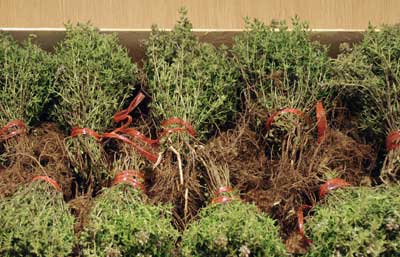Like
lace, thyme appears delicate with its small elliptical silver-tinged leaves,
yet thyme is an herb of with a sharp and penetrating fragrance of which there
are some sixty varieties and it is used in many food cultures around the world
producing vastly different taste profiles. It pairs well with mushrooms, stews, savory
pies, and sauces as many and varied as the cultures that employ the herb not
only as an flavoring additive in culinary creations, but as a preservative of
stored foods, a cleanser, and as a healthful supplement. As well as containing antioxidants, and
vitamin C and A, thyme has antimicrobial properties which not only keep foods
from spoiling, but can “cleanse” foods in which microbes have begun to
grow. Thyme protects and increases the percentage of healthy fats (omega-3 fatty
acid) found in cell membranes and other cell structures such as the brain,
kidney, and heart.
Used in Egypt, the oil of thyme was used to anoint, preserve, and prepare the bodies of those passing on to the next world. Thyme was associated with excellence and valor and bows of the pungent herb were burned to incense the temples of the gods of ancient Greece.
Thyme holds preeminence in French culinary culture in the bouquet garni. While components of the herb bundle typically
used to flavor stews may vary, thyme is nearly always included.
"Thyme is a hard herb, used either fresh or dried. This
is one of my great favourites and is used in many marinades and stews in this
household, fresh from the garden. There are thymes with a scent of lemon, but I
prefer the barn-door basic thyme, close to the wild thyme that grows on Puck's
bank." - Suzy Oakes
